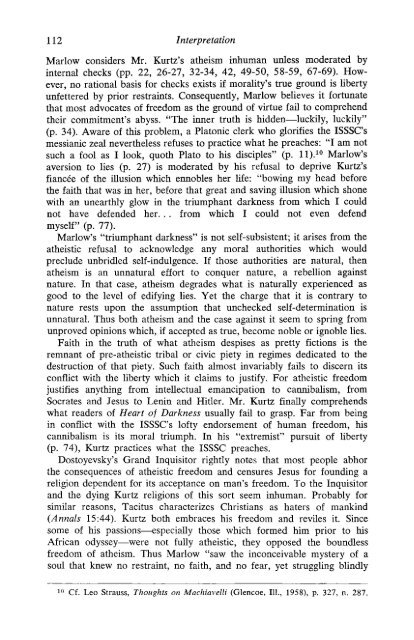philosophy - Interpretation
philosophy - Interpretation
philosophy - Interpretation
You also want an ePaper? Increase the reach of your titles
YUMPU automatically turns print PDFs into web optimized ePapers that Google loves.
myself"<br />
. from<br />
112 <strong>Interpretation</strong><br />
Marlow considers Mr. Kurtz's atheism inhuman unless moderated<br />
by<br />
internal checks (pp. 22, 26-27, 32-34, 42, 49-50, 58-59, 67-69). How<br />
ever, no rational basis for checks exists if morality's true ground is hberty<br />
unfettered by<br />
prior restraints. Consequently, Marlow believes it fortunate<br />
that most advocates of freedom as the ground of virtue faU to comprehend<br />
luckily"<br />
their commitment's abyss. "The inner truth is hidden luckily,<br />
a Platonic clerk who glorifies the ISSSC's<br />
(p. 34). Aware of this problem,<br />
messianic zeal nevertheless refuses to practice what he preaches: "I am not<br />
such a fool as I look, quoth Plato to his disciples" (p.<br />
II).10 Marlow's<br />
aversion to lies (p. 27) is moderated by his refusal to deprive Kurtz's<br />
fiancee of the Ulusion which ennobles her life: "bowing my<br />
the faith that was in her, before that great and saving<br />
head before<br />
Ulusion which shone<br />
with an unearthly<br />
glow in the triumphant darkness from which I could<br />
not have defended her. . which I could not even defend<br />
(p. 77).<br />
Marlow's "triumphant darkness" is not self-subsistent; it arises from the<br />
atheistic refusal to acknowledge<br />
any<br />
moral authorities which would<br />
preclude unbridled self-indulgence. If those authorities are natural, then<br />
atheism is an unnatural effort to conquer nature, a rebeUion against<br />
nature. In that case, atheism degrades what is naturaUy<br />
experienced as<br />
good to the level of<br />
edifying lies. Yet the charge that it is contrary to<br />
nature rests upon the assumption that unchecked self-determination is<br />
unnatural. Thus both atheism and the case against it seem to spring from<br />
unproved opinions which, if accepted as true, become noble or ignoble lies.<br />
Faith in the truth of what atheism despises as pretty fictions is the<br />
remnant of pre-atheistic tribal or civic piety in regimes dedicated to the<br />
destruction of that piety. Such faith almost invariably faUs to discern its<br />
conflict with the liberty<br />
which it claims to justify. For atheistic freedom<br />
justifies anything from inteUectual emancipation to cannibalism, from<br />
Socrates and Jesus to Lenin and Hitler. Mr. Kurtz finaUy comprehends<br />
what readers of Heart of Darkness usually faU to grasp. Far from being<br />
in conflict with the ISSSC's lofty endorsement of human freedom, his<br />
cannibalism is its moral triumph. In his "extremist" pursuit of liberty<br />
(p. 74), Kurtz practices what the ISSSC preaches.<br />
Dostoyevsky's Grand Inquisitor rightly<br />
notes that most people abhor<br />
the consequences of atheistic freedom and censures Jesus for founding a<br />
religion dependent for its acceptance on man's freedom. To the Inquisitor<br />
and the dying Kurtz religions of this sort seem inhuman. Probably for<br />
simUar reasons, Tacitus characterizes Christians as haters of mankind<br />
(Annals 15:44). Kurtz both embraces his freedom and revues it. Since<br />
some of his passions especially those which formed him prior to his<br />
African odyssey were not<br />
fully atheistic, they opposed the boundless<br />
freedom of atheism. Thus Marlow "saw the inconceivable mystery of a<br />
soul that knew no restraint, no faith, and no fear, yet struggling blindly<br />
10 Cf. Leo Strauss, Thoughts on Machiavelli (Glencoe, 111., 1958), p. 327, n. 287.
















